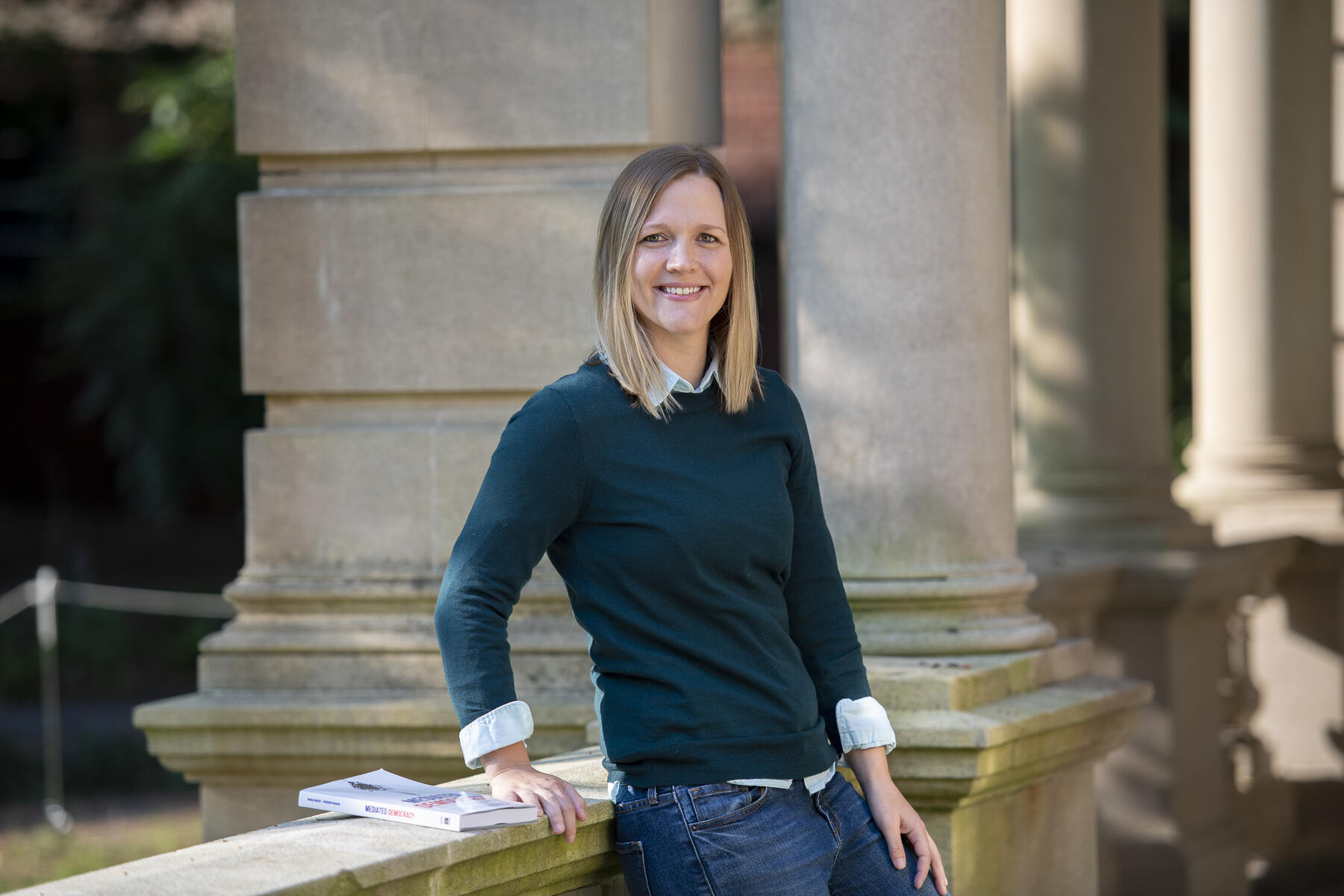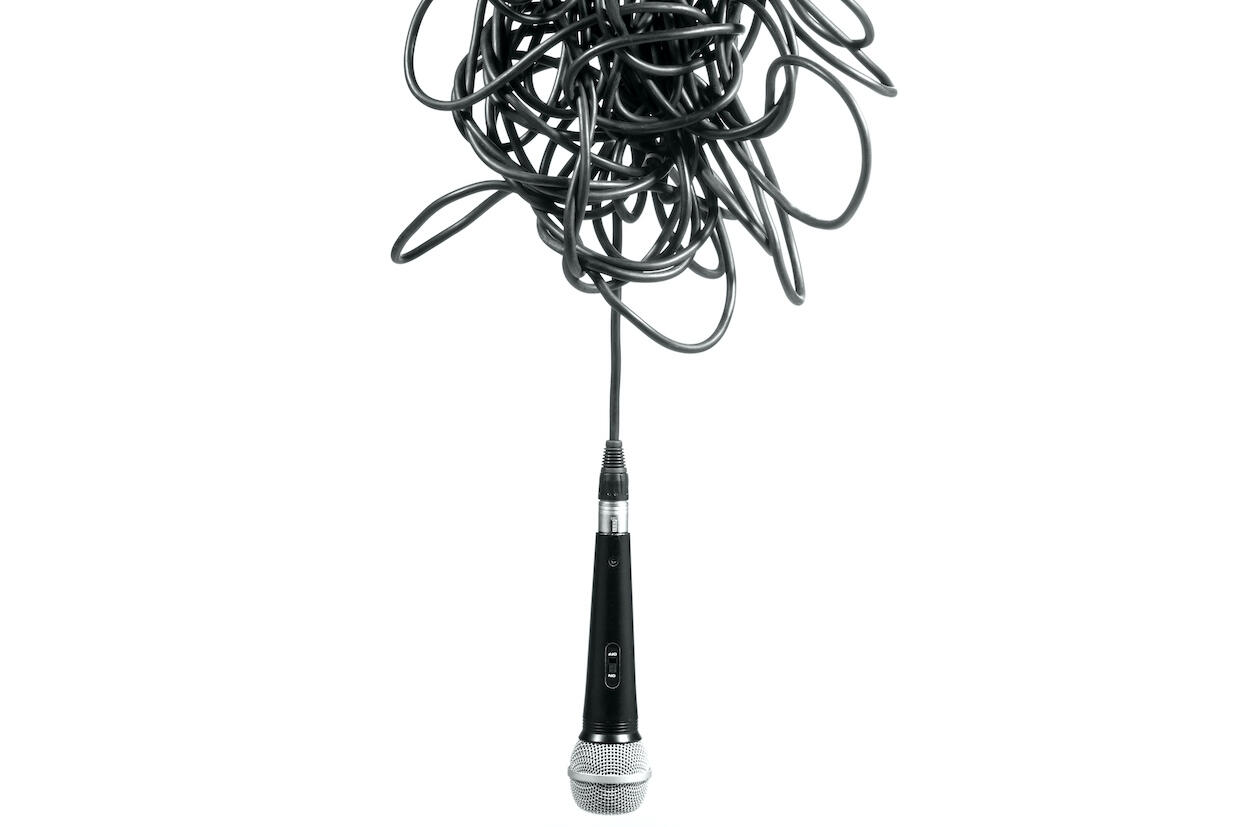
Sept. 24, 2020
Journalism professor’s new textbook offers a fuller understanding of how politics and media work
Share this story
Media, politics and society have a complex relationship. How they intersect and how media and politics work together are the focus of a new book by a Virginia Commonwealth University journalism professor set to be released on Oct. 1.
“Mediated Democracy: Politics, the News, and Citizenship in the 21st Century,” is a textbook by Mallory Perryman, Ph.D., an assistant professor in the Richard T. Robertson School of Media and Culture in the College of Humanities and Sciences, and Michael Wagner, Ph.D., a journalism professor at the University of Wisconsin-Madison.
Jay Wendland, Ph.D., an associate professor of political science at Daemen College, wrote in a review that the book “has a good grasp on the challenges faced by journalists trying to cover today's political environment, which should help students be more prepared to understand the world around them.”
“The text is an approachable, concise, and quite thorough account of today's complex political media environment," Wendland wrote.
Perryman said she and Wagner, both former journalists, are “on a quest to better understand media and politics and being a citizen.” She spoke with VCU News about the book and the role of media in politics.

What role do media play in governing?
The relationship between news media and law making and citizenship are not simple relationships. They go both ways. There is a lot of push and pull. There are complicated relationships about how news media impacts politics and how politics impacts new media and how citizens play a role. And it changes all the time. Technology changes. The context changes.
For example, a lot of people noticed that when President Donald Trump tweets it tends to get a lot of attention, especially in the beginning of his presidency. He really governed the news cycle. He was very good at setting the agenda after his tweets. It was distracting to journalists. His tweets would suck up all the oxygen in the room. You might take from that that presidents can dictate what the news media covers. But that’s not true either. Plenty of presidents have attempted to divert the news cycle and have been unsuccessful.
Politicians trying to sway the media depend on a lot of factors. On the other hand, when can what people are doing in media impact politics? We see that happen all the time. Politicians get negative attention and citizens push back. Politicians can ultimately bow to public pressure that was brought on by news coverage.
What role does personal bias play when we interpret media?
That is my favorite part of the book. I got to write two chapters on media bias, which is what I study. The first chapter is — are media biased? And we have to say media because we treat media as a plural now because it is a large entity. It encompasses a lot of different things.
The media really means a lot of different things depending on who you ask. It’s not a monolithic entity that is biased. One thing we did was we asked the audience. We can give a CNN story to Democrats and Republicans. They are both going to see it as biased but in different directions. It’s an effect called the hostile media perception. It’s been well-documented the past couple of decades. When you give very partisan people a news article, they tend to see it as biased against their own preference.
We think that when people are absorbing news there is some sort of defensive processing and you are interpreting information in a different way. Emotions and the source play a role in that.
Should students understand that journalists have a point of view?
Students need to know that journalists are not robots. We never have been. A journalist always has personal preferences. It’s not the journalist that is objective; it is the journalistic process that is objective. It’s just like a lawyer who does their job or a judge who does their job. They find evidence. In a way, it is scientific. It’s what we would call qualitative research.
In the scientific community, you go collect information. You collect evidence. You weigh it. Journalists have to make all sorts of decisions about what goes in a story. Who gets interviewed. Who doesn’t. They have to consider how to word something. How to phrase something. How to frame something. All of those are subjective decisions that could introduce bias into a story. But what is important is that you have your perspective and you know your perspective. It’s the journalist’s job to put that aside. You can have feelings and opinions and still have an objective reporting process.
We can give a CNN story to Democrats and Republicans. They are both going to see it as biased but in different directions. It’s an effect called the hostile media perception. … When you give very partisan people a news article, they tend to see it as biased against their own preference.
Historically, most political stories are horse-race journalism — coverage that treats politics like a game or sport. Is that good or bad?
Objectively it’s a bad thing. If you are covering the latest polls, you are not covering something else. It would probably be issue-based coverage. In journalism, there has been a longstanding bias toward horse-race polling and presenting politics as a game. It’s well-documented. It has been happening for a long time. It’s not a partisan bias.
Journalists like polls because they are new, and the biggest bias in journalism is toward what is new. So when a new poll comes out, they report on it. It’s easy. It almost writes itself. And you can’t spend five days on Joe Biden’s plan for climate change. It’s not new anymore. It’s a structural bias.
How can the book motivate students to action?
We have a section of each chapter called “how can I help?” It’s a call to action. What can students do to be better news consumers? What is the best way to contact a lawmaker to try to make change happen? How can you be a better citizen? How can you have a fuller understanding of how politics and media work?
If you don’t know how it works, you are not going to be able to impact the process. For example, we have a whole section on protests. Protestors are really good at getting attention. When you have protests, you can get the media to pay attention to you initially. As protests go on, the media tends to gravitate to doing a story with voices from official sources. If you know that ahead of time, you know how that works and have a better plan.
Journalists are not robots. We never have been. A journalist always has personal preferences. It’s not the journalist that is objective; it is the journalistic process that is objective.
The book contains question-and-answer sections from experts in the field. Why did you want those voices included?
There are a lot of people who do really cool things. Take for example the world of social science. When you think of anything, there is somebody who studies that.
There are people who study the effects of polling on people. There are people who study the effect of political advertising. All of this knowledge is out there. We wanted to make that information accessible. That is not always the case in academic work. The Q&A is an easily digestible format. People can share stuff outside of an academic journal, which are in fact not that fun to read.
What should students take away from the book?
I would hope that students who have read this book would not give in to simple explanations for how media and politics work. All too often I hear people say: “Trump supporters think this way because the media told them.” That is such an oversimplification and not in fact how any of this works.
The media is good at telling people what to think about, but it is particularly bad about telling people what to think. Those sorts of things are covered pretty thoroughly in the book. It’s a complex relationship and very context-dependent.
Students will come away understanding that these are not super straightforward relationships, and they will better understand some of the myths about media and society. They should also have a sense that being a political journalist and reporting on politics is hard. You never make anybody happy. That is not your job.
Subscribe to VCU News
Subscribe to VCU News at newsletter.vcu.edu and receive a selection of stories, videos, photos, news clips and event listings in your inbox.







